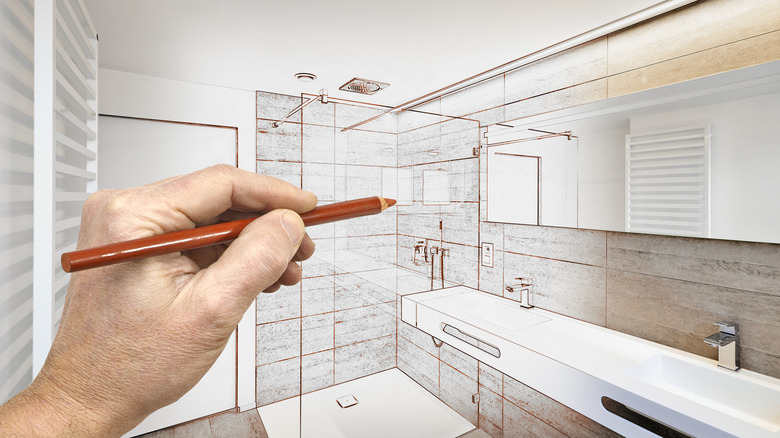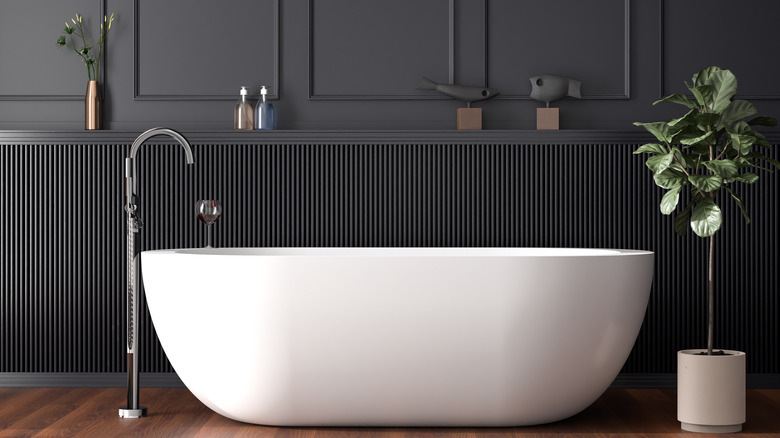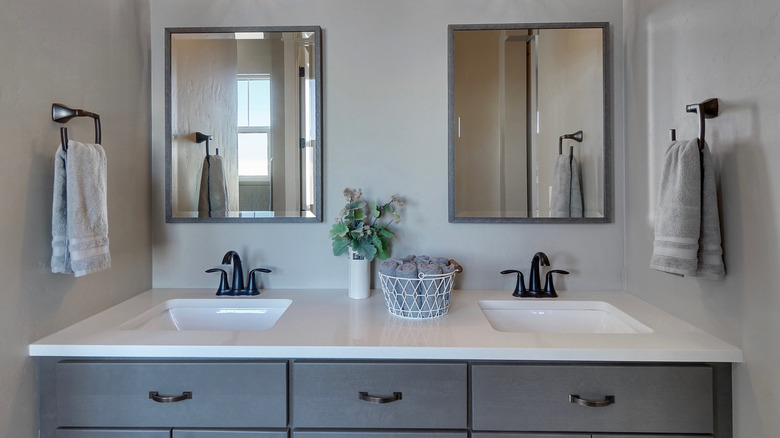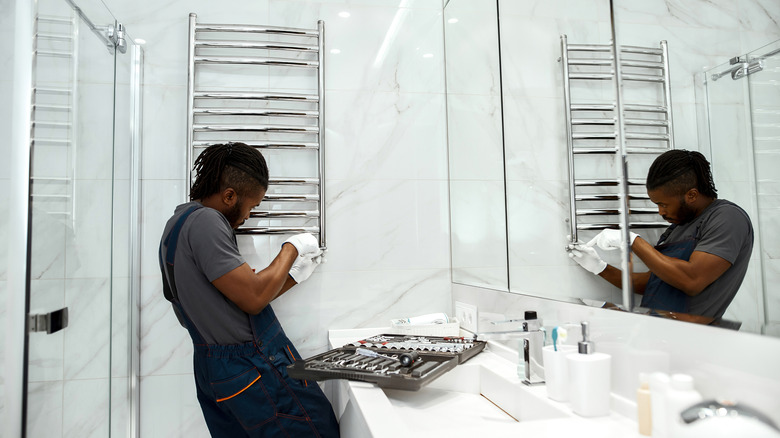5 Questions You Should Ask Before Starting Your Bathroom Renovation
Starting any kind of home renovation can be incredibly exciting. But renovations are also not something you should rush into. All good renovations start with preparation to ensure it runs as smoothly as possible. According to Community Renovations, bathrooms are one of the most popular renovations homeowners complete, next to kitchens. Both also add a ton of value to your home. Because of the plumbing involved, bathroom renovations can be tricky, which is another reason why you must approach a bathroom remodel with caution.
But a bathroom renovation can feel personal because it's a place where you can relax and unwind after a long day. But even the most well-designed bathrooms can lack function. That's why a bathroom renovation has to be done strategically. You shouldn't only focus on making your bathroom beautiful but also a room that works well for every person who plans to use it. Before hammers start swinging, you should ask yourself these five questions.
1. What features are in your dream bathroom?
Start your bathroom renovation in the planning phase. No matter the scope of your bathroom renovation, you should think about what features you want to see in your future dream bathroom. Consider putting the features in categories such as "must have" and "nice to have" to help you prioritize the projects in your remodel. You also want to consider how your bathroom currently functions and how you can improve the function, whether that means more storage or enlarging the bathroom.
Consider functional upgrades like a double vanity, touchless faucets, or a powerful ventilation system, says Cooper Design Build. A new ventilation system is something that should be upgraded because it can protect your new bathroom from humidity damage as well as mold and mildew growth. A free-standing tub and shower stall are other common bathroom updates. New tiles for the floor or shower can be cosmetic upgrades that go a long way.
2. Is the bathroom worth the investment?
If you're going to spend a ton of money on something, you want to ensure your investment makes sense. So is a bathroom worth the investment? In general, yes. According to Zillow, on the high end of a return on investment, homeowners, on average, can see an 87.7% return on their investment. In comparison, the low end of the average ROI falls around 58.8%. So if you're looking to sell your home, a bathroom removal can definitely raise your home value and help you recoup the cost put into the remodel. However, remodeling to sell is often different than remodeling for yourself. Experts recommend making the bathroom as neutral as possible to appeal to most buyers.
So if you're not planning to sell your home, is a bathroom worth the investment? Yes, absolutely. You don't always have to renovate with value as your top priority. Sometimes renovating to improve the function of the space or even to improve the appearance of the bathroom is your top priority. Putting time, effort, and money into a renovation that will improve your everyday life — especially when you plan to be in your home for years to come — is definitely worth the investment.
3. What's the budget for the project?
It's no secret that home renovations can be expensive. Bathrooms especially can be a costly project. According to Angi, the national average of a bathroom remodel is $10,788, with the average cost ranging from $6,152 to $15,246. So what affects the price of a remodel? Materials, project scope, and labor costs can quickly increase the budget before you realize it. But the hidden culprit to a rising bathroom renovation budget can be the plumbing. When demoing your bathroom, you may find that your pipes need to be upgraded. Or, if you want to change the layout, you'll need to move the plumbing around. Plumbing can quickly take a chunk of your budget.
So it's important to set a budget before the project and try your best to stick to it. With your scope and renovation wants in mind, calculate how much it will cost to transform your bathroom. It's also a good idea to either put extra money aside or dedicate a portion of your budget as a contingency. You can use this money to fix unforeseen issues that are sure to arise during the renovation. With a dedicated budget for contingencies, you won't have to take as much money away from projects you really want in your bathroom.
4. What projects can be done yourself?
If you want to save money or be hands-on with your project, the best option might be to do it yourself. But not every homeowner is handy and not every renovation project can be done by yourself. First, you'll want to consider your abilities and the scope of the project. If you're well-versed in renovations, tackling a bathroom could be a breeze, but if you're a beginner, bathroom renovations can quickly get overwhelming. You'll also want to think about the scope of the project. If you're remodeling an entire bathroom, doing it yourself could take a few weeks or even months to complete. Smaller cosmetic projects may only take the weekend.
For those who want to DIY their bathroom remodel, cosmetic projects like repairing walls, replacing fixtures like a new shower head or faucet, or adding a mirror are pretty easy to take on, says Bankrate.com. But expanding the bathroom, installing lighting fixtures, or moving plumbing will require background knowledge to be done correctly.
5. What can a contractor do?
Many people will opt to hire a contractor for the projects they cannot complete or to complete the entire bathroom remodel. Experts often suggest homeowners hire contractors to complete their home projects. But hiring the right contractor is just as important. It's important to get multiple bids from contractors that include the estimated timeline and budget to ensure you're getting the best price. You'll also want to make sure the contractor has an updated license and insurance.
Hiring a contractor often has more benefits than doing the renovation yourself. Contractors are often able to finish the project quicker because they have a dedicated team working under them. Contractors also often have contacts with plumbers and electricians that they know perform good work. No matter what your bathroom vision is, contractors can usually handle more complicated tasks than the average homeowner, according to The Cabinet Market. Plus, contracts usually have access to high-quality materials and fixture that homeowners don't have access to.





